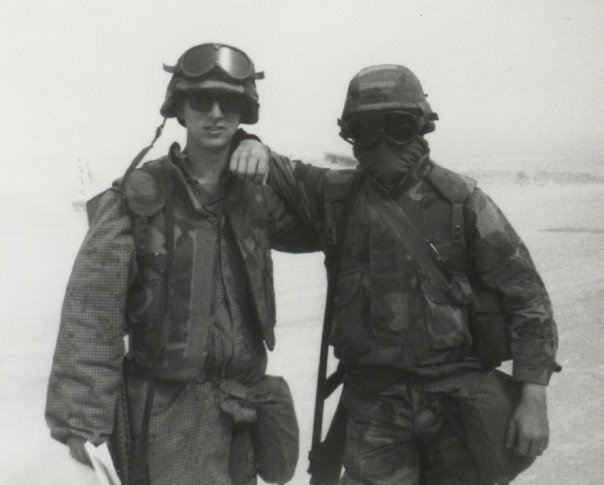"One of our goals is to start "the conversation.' We want veterans to know that these aren't their invisible burdens to bear. We sent them into harm's way - we need to bring them all of the way home."
I recently wrapped up two newspaper interviews. Getting the word out about the film is easy. Talking about the thematic elements of the story is a little harder - but absolutely necessary.
The men and women we send thousands of miles away from home, task with missions that are dangerous and executed under harsh conditions will invariably be exposed to trauma.
The scale of that trauma varies from distant explosions to wearing a comrade's brains around because they got their head blown off right next to you. For some - many, actually - the most lingering traumas are the ones that happen unexpectedly and outside of the "normal" context of war.
Destruction, gore, violence and stress might be expected but their reality might be very different from what the combatant believed they would be before setting foot in a war zone.
For others, the morality of situations they found themselves in may go against everything they'd be taught as a child...or believed as a civilian.
It's disturbingly easy to squeeze a trigger with your rifle pointed at another human being if you feel endangered or your commander tells you to "open fire."
That was a big one for me.
A metal lever and a tiny spring mechanism, when coupled with the tension of drawing your finger in tighter, sends a bolt with a firing pin ramming into a cartridge and suddenly a steel bullet bursts out of the muzzle with a puff of smoke and a slight recoil against your shoulder.
Less than a second later, that piece of steel enters flesh, tears through muscle and slams into bone.
There's no discussion, no time to "think"...it just happens. The really frightening part is that when it does, there is no "Hollywood" close-up...no teary-eyed gaze... no tagline uttered... because there is still imminent danger, violence and chaos all around. In reality, you're still firing rounds into that person you just shot and then firing at the next "target."
Some people can reconcile that scenario fairly quickly: Life and death.
I didn't.
When I got home there were parades and a hero's welcome waiting. Everyone had yellow ribbons up and flags waving. But inside - in my mind - the gravity and finality of my experiences started to seep in.
A year after getting home form the war, I was out of the Army and in college. That's when I really started thinking back over my experiences and trying to find a balance between who I was, who I thought I was and who I would be from then on.
It is a reconciliation that is still ongoing.
The men and women we send thousands of miles away from home, task with missions that are dangerous and executed under harsh conditions will invariably be exposed to trauma.
The scale of that trauma varies from distant explosions to wearing a comrade's brains around because they got their head blown off right next to you. For some - many, actually - the most lingering traumas are the ones that happen unexpectedly and outside of the "normal" context of war.
Destruction, gore, violence and stress might be expected but their reality might be very different from what the combatant believed they would be before setting foot in a war zone.
For others, the morality of situations they found themselves in may go against everything they'd be taught as a child...or believed as a civilian.
It's disturbingly easy to squeeze a trigger with your rifle pointed at another human being if you feel endangered or your commander tells you to "open fire."
That was a big one for me.
A metal lever and a tiny spring mechanism, when coupled with the tension of drawing your finger in tighter, sends a bolt with a firing pin ramming into a cartridge and suddenly a steel bullet bursts out of the muzzle with a puff of smoke and a slight recoil against your shoulder.
Less than a second later, that piece of steel enters flesh, tears through muscle and slams into bone.
There's no discussion, no time to "think"...it just happens. The really frightening part is that when it does, there is no "Hollywood" close-up...no teary-eyed gaze... no tagline uttered... because there is still imminent danger, violence and chaos all around. In reality, you're still firing rounds into that person you just shot and then firing at the next "target."
Some people can reconcile that scenario fairly quickly: Life and death.
I didn't.
When I got home there were parades and a hero's welcome waiting. Everyone had yellow ribbons up and flags waving. But inside - in my mind - the gravity and finality of my experiences started to seep in.
A year after getting home form the war, I was out of the Army and in college. That's when I really started thinking back over my experiences and trying to find a balance between who I was, who I thought I was and who I would be from then on.
It is a reconciliation that is still ongoing.

 RSS Feed
RSS Feed